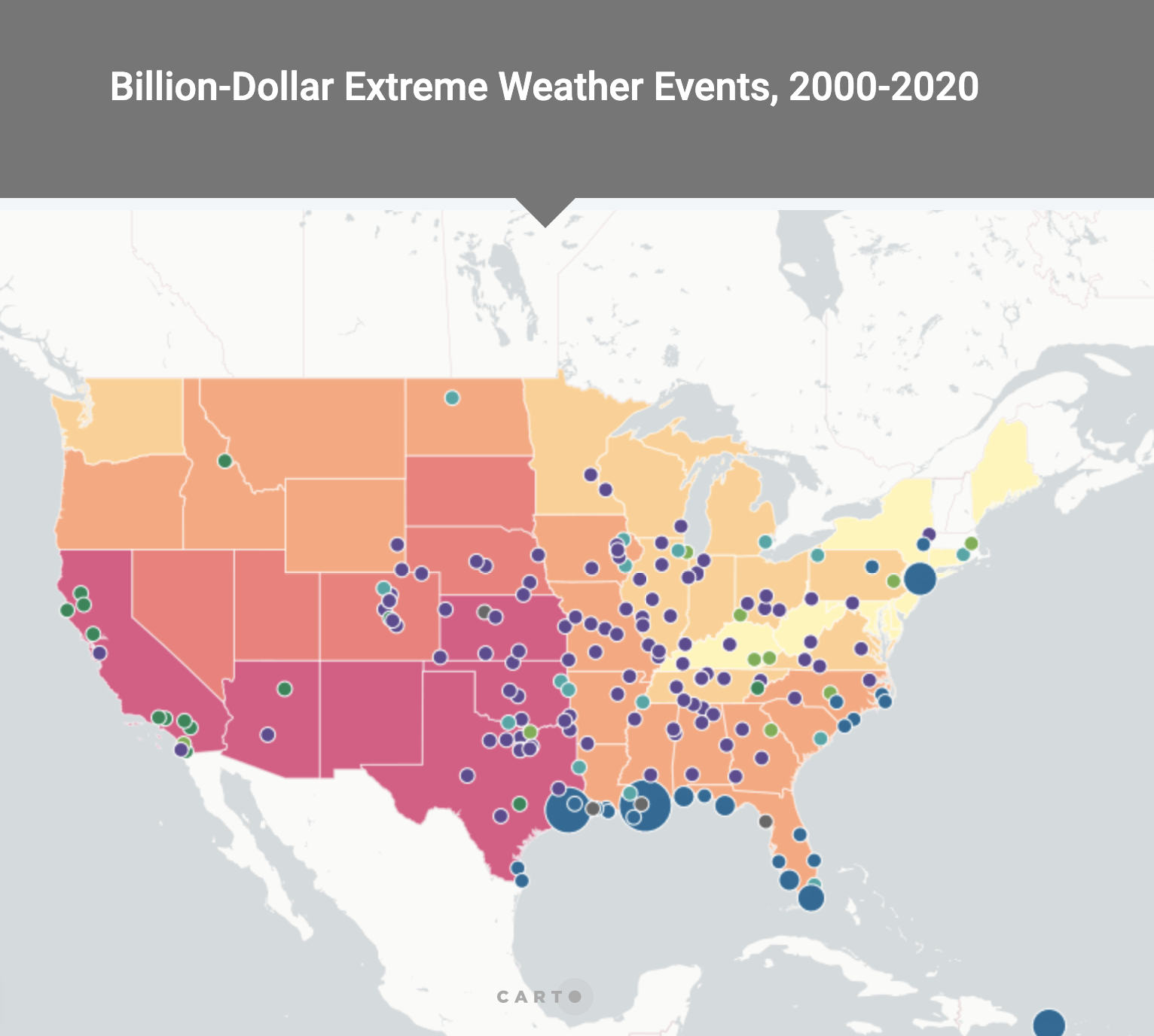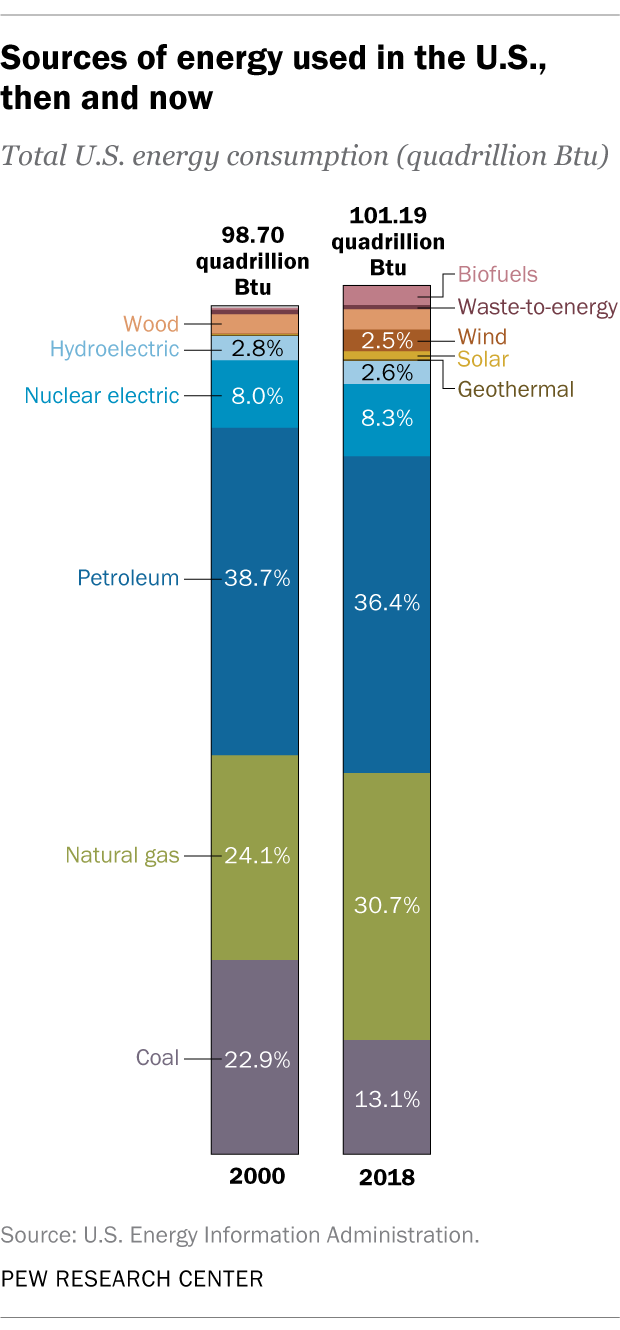Countering Climate Change With Renewable Energy Technologies
Renewable energy technologies, such as advanced biofuels for transportation, are key for U.S. efforts to mitigate climate change
Climate change is bringing about rising temperatures, which have significant negative impacts on humans and the environment, and transitioning to renewable energy sources, such as biofuels, can help meet this challenge. One consequence of higher global temperatures is the increasing frequency of extreme weather events that cause massive amounts of harm and damage. As depicted in Figure 1, six of the 10 costliest extreme weather events in the U.S. have occurred in the last 10 years, amounting to over $411 billion in damages (in 2020 dollars and adjusted for inflation). The other four occurred between 2004 and 2008, and the costs of future extreme weather events are expected to keep climbing.

U.S. extreme weather events from 2000 to 2020 resulting in at least $1 billion in damages. Figure adapted from an interactive Center for Climate and Energy Solutions tool.
Moreover, the World Health Organization estimates that, globally, climate change is responsible for over 150,000 deaths per year. This is because in addition to extreme weather events, climate change contributes to the spread of diseases, reduced food production, and many other problems.
Transitioning to renewable energy, and reducing reliance on fossil fuels, is one way to help slow down the effects of climate change. While renewables used to be a more expensive option, new clean energy technologies are lowering costs and helping to move economies away from fossil fuels. For example, solar panel prices decreased 75 to 80 percent between 2009 and 2015. Due to similar trends in other renewables like wind and hydropower, renewable energy generation technology accounts for over half of all new power generation capacity brought online worldwide every year since 2011.
More must be done to ensure that renewable energy technologies are key contributors to the mitigation of climate change. As of 2018, solar and wind accounted for less than 4% of all the energy used in the U.S. (Figure 2). The amount of energy generated by solar panels has increased almost 46-fold since 2008, but still only amounts to about 1% of the total energy generated in the country. Unfortunately, renewables currently provide only a small fraction of the total energy produced, and to counter climate change, this contribution must drastically increase.

Sources of energy used in the U.S. during the year 2000 and the year 2018. Figure reproduced from DeSilver 2020, Pew Research Center.
Nonrenewable sources are still frequently used because they are very dense in energy. In the transportation sector, for example, gas or diesel fuels have about 40 times more energy, pound for pound, than the leading electric battery technologies. In order for an electric car to travel 360 miles, which is the average distance traveled on a full 12.4 gallon tank of gas, the car would need a battery weighing over 1,300 pounds.
To reduce reliance on petroleum-based fuels, particularly for heavy-duty vehicles and airplanes, one potential solution is biofuels. Biofuels are produced by breaking down plant material and converting it into usable fuels, such as ethanol or biodiesel. Corn ethanol is already added to gas to cut down on greenhouse gas emissions. However, creating ethanol is not a zero-carbon process, and supplementing with corn ethanol averages just under 40 percent lower carbon emissions than using only gasoline. Corn ethanol also relies on land which could be used for growing other food crops. Researchers are currently studying how to use invasive plants, as well as plants that require little water, fertilizer, or land to grow, to create the next generation of biofuels. Some promising plant feedstock options include hemp, switchgrass, carrizo cane, jatropha shrubs, and algae. New biotechnologies are also being studied to develop more efficient ways to break down biomass into sugars, which microbes then convert into biofuels. There is also ongoing research to create microbes that can directly convert plants to biofuels, and to enable microbes to produce long-chain, energy-dense hydrocarbons that could be used to fuel heavy-duty vehicles and airplanes.
The Information Technology and Innovation Foundation developed several recommendations which could bolster the implementation of biofuels. These recommendations include:
- Increasing investments in bioenergy and biomanufacturing research and development by 150 percent by the next five years;
- Engaging the Department of Energy and the Department of Agriculture to support the development of biofuels for aviation, shipping, and “other hard-to-electrify transportation sectors;” and
- Expanding research into gene-editing tools that can be used to improve biomass processing, increasing the diversity of plant feedstocks that could be leveraged for lower-cost biofuel production.
By improving the efficiency of renewable energy technologies like biofuels, wind, and solar, and further innovating in the renewables space, the U.S. science and technology community can help ensure that renewables are leveraged in the effort to counter the climate crisis.
This CSPI Science and Technology Policy Deep Dive expands upon a scientific exchange between Congressman Bill Foster (D, IL-11) and his new FAS-organized Science Council.
The current planned capacity for lithium processing in the U.S. is on track to meet demand from domestic battery factories. However, current planned capacity for nickel, cobalt, and graphite still fall well short of future demand.
Dr. Pierre-Clément Simon and Dr. Casey Icenhour come from different backgrounds, but share similar passions: for driving forward progress in fusion energy and mentoring early career scientists.
As emerging clean energy technologies move along the innovation pipeline from first concept to commercialization, they encounter hurdles that can prove to be a death knell for young startups.
As ‘Friends of FESI’ we want to see this new foundation set up from day one to successfully fulfill the promise of its large impact.